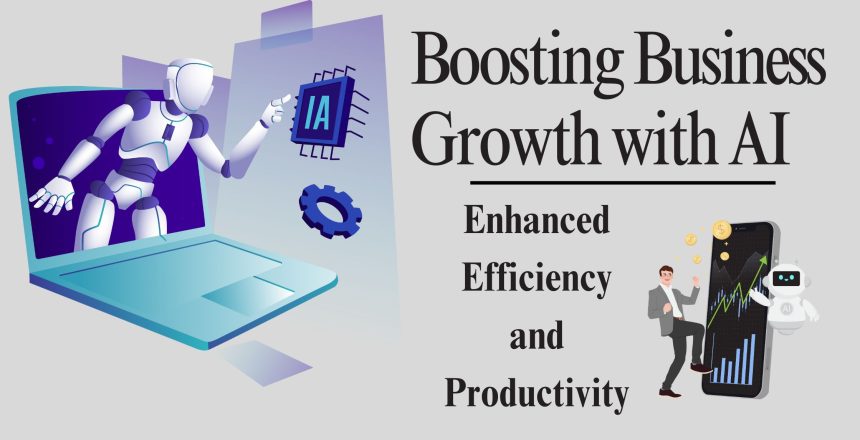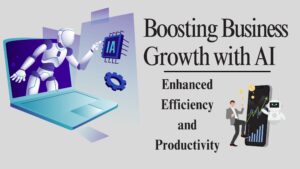In today‘s dynamic business environment, harnessing AI is no longer a luxury but a necessity for growth, especially for small businesses striving to compete. The integration of AI tools has proven to significantly enhance productivity, with reports indicating that customer service agents can handle 13.8% more inquiries per hour and business professionals can write 59% more documents in the same timeframe due to these technologies which underscores the claim that “simple applications [of AI] are likely to produce an underappreciated boost to productivity.” . Additionally, workers utilizing AI have reported an impressive 80% improvement in productivity, translating to a staggering 66% increase in their ability to complete daily tasks equivalent to 47 years of natural productivity gains based on the average U.S. labor productivity growth of 1.4% per year. . Harvard research highlights that management consultants leveraging AI can finish tasks 25.1% faster and produce over 40% higher quality work compared to their peers demonstrating the transformative impact of AI tools in the workplace. . With such compelling evidence, it’s clear that adopting AI is crucial for businesses aiming to thrive in a competitive market.
Enhanced Efficiency and Productivity
Incorporating AI tools into business operations can lead to remarkable gains in efficiency and productivity. These tools are designed to automate routine tasks, thereby freeing up human resources to focus on more strategic and value-added activities. By eliminating the need for manual intervention in repetitive tasks, AI can significantly reduce operational costs and streamline processes.
One of the most impactful ways AI boosts efficiency is through automation. For instance, AI-powered chatbots can handle basic customer service inquiries, freeing up human agents to deal with more complex issues. A study revealed that customer service support agents handled 13.8% more customer inquiries per hour due to AI tools. This illustrates how AI can optimize customer interactions, leading to quicker resolution times and enhanced customer satisfaction.
Additionally, AI-driven automation software can assist business professionals in managing their workloads more effectively. Business professionals could write 59% more work-related documents per hour due to AI tools. By automating the generation of reports, emails, and other documents, AI allows employees to dedicate more time to critical thinking and decision-making tasks. This not only improves individual productivity but also enhances overall organizational efficiency.
AI tools also contribute to efficiency by improving task management and workflow automation. Tools like Robotic Process Automation (RPA) can automate data entry, invoice processing, and other administrative tasks that typically consume a significant portion of employees’ time. This can lead to a more streamlined workflow, reducing the likelihood of human error and speeding up task completion times.
The benefits of AI are not limited to administrative tasks. In the field of software development, for example, AI-powered coding assistants can help programmers write code more efficiently. Programmers could code 126% more projects each week due to AI tools. These tools can suggest code snippets, identify bugs, and even generate entire code blocks, enabling developers to focus on more complex problem-solving tasks.
Moreover, AI can significantly enhance productivity by providing employees with intelligent insights and recommendations. Tools that leverage machine learning algorithms can analyze vast amounts of data to identify trends, predict outcomes, and offer actionable insights. For instance, sales teams can use AI-powered CRM systems to prioritize leads based on their likelihood to convert, thereby optimizing their sales strategies and improving their conversion rates.
The overall impact of AI on productivity is profound. Staff using AI report an 80% improvement in productivity due to the technology. This improvement is not just a marginal gain; it represents a significant leap in the ability to complete tasks efficiently. The use of AI can lead to faster decision-making, quicker turnaround times, and a more agile business environment.
In summary, AI tools offer a multifaceted approach to enhancing efficiency and productivity within businesses. By automating repetitive tasks, providing intelligent insights, and streamlining workflows, AI enables companies to operate more efficiently and effectively. This not only leads to cost savings but also frees up human resources to focus on innovation and strategic growth initiatives. As a result, businesses that embrace AI are better positioned to thrive in today‘s competitive landscape.
Improved Decision Making
In today‘s data-driven world, the ability to make informed decisions is a cornerstone of business success. AI tools significantly enhance decision-making processes by analyzing vast amounts of data quickly and accurately. This allows businesses to uncover trends, patterns, and insights that might otherwise go unnoticed, leading to smarter and more strategic decisions.
One of the most compelling advantages of AI in decision-making is its ability to process and analyze data at scale. Traditional data analysis methods can be time-consuming and prone to human error. In contrast, AI algorithms can sift through enormous datasets in a fraction of the time, providing real-time insights that are crucial for timely decision-making. For instance, AI-powered predictive analytics can forecast market trends, customer behaviors, and even potential operational disruptions, allowing businesses to prepare and respond proactively.
AI tools like predictive modeling and recommendation systems are invaluable in this regard. Predictive modeling uses historical data to predict future outcomes, enabling businesses to make data-driven decisions. For example, a retail company can use predictive models to forecast inventory needs, reducing the risk of overstocking or stockouts. Similarly, recommendation systems analyze user behavior to provide personalized product suggestions, thereby enhancing customer satisfaction and increasing sales.
AI can democratize decision-making by providing less experienced and lower-skilled workers with tools to perform at higher levels. Research has shown that these employees can see a 35% improvement in performance when using AI tools, without negatively affecting their top-performing colleagues. This means that AI can help level the playing field within an organization, enabling all employees to contribute more effectively to the decision-making process.
Another significant benefit of AI in decision-making is its ability to eliminate bias. Human decision-makers are often influenced by cognitive biases that can skew judgment. AI, when properly trained and implemented, can provide objective insights based on data rather than intuition. This helps in making more balanced and fair decisions, which is particularly important in areas like hiring, promotions, and resource allocation.
In the financial sector, AI tools are revolutionizing decision-making processes. For example, AI-driven trading algorithms analyze market data to execute trades at optimal times, maximizing profits and minimizing risks. Similarly, financial institutions use AI to assess creditworthiness more accurately, reducing the risk of default and improving loan approval processes. These applications demonstrate how AI can provide a competitive edge by enhancing the precision and speed of financial decisions.
AI is also transforming decision-making in the healthcare industry. By analyzing patient data, AI can assist doctors in diagnosing diseases more accurately and recommending personalized treatment plans. This not only improves patient outcomes but also optimizes resource allocation within healthcare facilities. For example, AI can predict patient admission rates, helping hospitals manage their staffing and inventory more efficiently.
Marketing is another area where AI is making a significant impact. AI-powered tools can analyze customer data to identify the most effective marketing strategies and channels. This allows businesses to allocate their marketing budgets more efficiently and achieve better ROI. For instance, AI can determine the optimal time to send marketing emails or post on social media, ensuring maximum engagement and conversion rates.
In supply chain management, AI enhances decision-making by providing real-time insights into logistics and inventory levels. AI-powered systems can predict potential supply chain disruptions and recommend alternative routes or suppliers, minimizing delays and costs. This level of foresight is invaluable for maintaining smooth operations and meeting customer demands.
AI’s ability to improve decision-making is not limited to large corporations; small businesses can also reap significant benefits. For instance, small businesses can use AI tools to analyze customer feedback and sentiment, allowing them to make informed decisions about product development and customer service improvements. This enables small businesses to compete more effectively with larger players by making smarter, data-driven decisions.
The integration of AI in decision-making processes also fosters a culture of continuous improvement. AI systems can provide ongoing feedback and performance metrics, helping businesses to refine their strategies and operations continually. This iterative approach ensures that businesses remain agile and responsive to changing market conditions.
In summary, AI tools empower businesses to make more informed, timely, and objective decisions. By leveraging AI’s data-processing capabilities, companies can uncover valuable insights that drive strategic growth and innovation. Whether it’s through predictive analytics, recommendation systems, or real-time data analysis, AI is revolutionizing decision-making across industries, enabling businesses to stay ahead of the curve in an increasingly competitive landscape.
Enhanced Customer Experience
In today‘s customer-centric market, businesses are constantly seeking ways to enhance customer experiences and build lasting relationships. AI tools are playing a pivotal role in this transformation by offering personalized interactions and efficient service solutions that cater to individual customer needs.
One of the most significant advantages of AI in customer experience is its ability to deliver highly personalized interactions. AI algorithms can analyze customer data, such as browsing history, purchase patterns, and preferences, to provide tailored recommendations. This level of personalization not only enhances customer satisfaction but also boosts sales by promoting products and services that align with the customer’s interests.
AI-powered chatbots are another game-changer in customer service. These virtual assistants can handle a wide range of customer inquiries, from answering common questions to processing orders and providing technical support. By offering 24/7 availability, chatbots ensure that customers receive prompt responses regardless of the time of day. This immediate assistance can significantly improve customer satisfaction and loyalty.
Moreover, AI-driven customer service tools can efficiently manage and resolve issues. For example, natural language processing (NLP) enables chatbots to understand and respond to complex customer queries more accurately. This reduces the need for human intervention, allowing customer service agents to focus on more complicated and nuanced issues that require a personal touch. As a result, the overall efficiency of customer support teams is enhanced, leading to quicker resolution times and a more positive customer experience.
AI’s ability to analyze sentiment is another powerful tool for enhancing customer interactions. Sentiment analysis algorithms can monitor social media platforms, customer reviews, and feedback forms to gauge customer sentiment in real-time. This information allows businesses to identify potential issues before they escalate and address customer concerns proactively. By responding swiftly to negative feedback and recognizing positive sentiments, companies can foster stronger customer relationships and improve their brand reputation.
In addition to improving direct customer interactions, AI tools also help businesses optimize their customer service strategies. For instance, AI can predict customer behavior and preferences, enabling companies to tailor their marketing efforts more effectively. By understanding which products or services are likely to resonate with different customer segments, businesses can design targeted marketing campaigns that drive engagement and conversion rates.
AI’s predictive capabilities extend to anticipating customer needs. For example, recommendation engines can suggest complementary products based on a customer’s previous purchases, enhancing the shopping experience and increasing the likelihood of repeat business. Similarly, predictive analytics can forecast when a customer might need a service or product replenishment, allowing businesses to send timely reminders and offers, thus ensuring customer satisfaction and retention.
The integration of AI in customer experience is not just beneficial for large enterprises; small businesses can also leverage these tools to compete effectively. For example, small businesses can use AI to automate customer interactions and provide a level of service that rivals larger competitors. By utilizing AI-driven tools, small businesses can offer personalized recommendations and efficient support, creating a memorable customer experience that encourages loyalty and repeat business.
Research indicates that AI implementation can drive significant business growth, with three out of five business owners predicting that AI will boost sales growth. This optimism reflects the transformative impact AI can have on enhancing customer experiences and, by extension, driving business success.
AI’s ability to handle large volumes of data and provide actionable insights is invaluable in customer service. For instance, customer relationship management (CRM) systems powered by AI can segment customers based on their behaviors and preferences, allowing for more targeted and effective communication. By understanding the unique needs of different customer groups, businesses can tailor their approaches to meet specific demands, resulting in higher satisfaction and loyalty.
In the hospitality industry, AI is revolutionizing the way businesses interact with guests. AI-powered concierge services can provide personalized recommendations for dining, entertainment, and activities based on guest preferences and past behaviors. This level of customization enhances the guest experience, making their stay more enjoyable and memorable.
In retail, AI is transforming the shopping experience by offering personalized product recommendations and virtual shopping assistants. These tools can guide customers through their shopping journey, helping them find products that match their tastes and needs. By providing a seamless and personalized shopping experience, retailers can increase customer satisfaction and drive sales.
AI’s role in enhancing customer experience extends to post-purchase interactions as well. AI-driven feedback systems can automatically follow up with customers after a purchase, collecting valuable insights about their experience and identifying areas for improvement. By continuously gathering and analyzing customer feedback, businesses can make data-driven decisions to refine their products and services, ensuring a consistently high level of customer satisfaction.
In summary, AI tools are revolutionizing the way businesses interact with customers, offering personalized and efficient service solutions that cater to individual needs. From chatbots and virtual assistants to predictive analytics and sentiment analysis, AI is enhancing customer experiences across various industries. By leveraging these advanced technologies, businesses can build stronger relationships with their customers, drive sales growth, and maintain a competitive edge in today‘s dynamic market.
Increased Innovation
AI is fundamentally transforming the landscape of innovation across industries. By harnessing the power of AI, businesses can generate new ideas, streamline research and development processes, and drive innovative solutions that were previously unimaginable. This transformative power of AI stems from its ability to analyze vast amounts of data, identify patterns, and make intelligent predictions, thereby fostering a culture of continuous innovation.
One of the key ways AI drives innovation is through natural language processing (NLP). NLP enables machines to understand, interpret, and generate human language, making it possible for businesses to analyze customer feedback, social media interactions, and other text data to uncover emerging trends and customer needs. For example, AI-powered tools can analyze customer reviews to identify common pain points and suggest improvements, leading to the development of new products or services that better meet customer demands.
Generative AI is another groundbreaking technology that fuels innovation. By leveraging deep learning algorithms, generative AI can create new content, designs, and even entire product prototypes. This technology is particularly valuable in creative industries such as fashion, entertainment, and marketing, where the ability to generate unique and original content can set a business apart from its competitors. For instance, fashion designers can use generative AI to create new clothing patterns, while marketers can generate engaging advertising campaigns tailored to specific target audiences.
AI also accelerates the research and development (R&D) process by automating complex tasks and providing intelligent insights. In the pharmaceutical industry, for example, AI-powered tools can analyze vast datasets to identify potential drug candidates, predict their efficacy, and optimize clinical trials. This not only speeds up the drug discovery process but also reduces costs and increases the likelihood of successful outcomes. Similarly, in the manufacturing sector, AI can optimize product designs by simulating different materials and configurations, leading to more efficient and innovative products.
The financial sector is experiencing a surge in innovation driven by AI. AI-powered algorithms are transforming investment strategies by analyzing market data and predicting stock movements with high accuracy. This enables financial institutions to develop innovative investment products and services that offer better returns and reduced risks. Additionally, AI is being used to detect fraudulent activities and ensure compliance with regulatory requirements, fostering a safer and more transparent financial ecosystem.
AI’s impact on corporate innovation is evident in the significant increase in profits for businesses that have embraced AI technologies. Between January and April 2023, corporate profits surged by 45% as a result of heightened interest in AI models. This remarkable growth underscores the value of AI in driving business success through innovation.
Moreover, AI fosters a collaborative innovation environment by enabling cross-functional teams to work more effectively. AI-powered collaboration tools can facilitate communication and idea-sharing among team members, regardless of their geographical location. This leads to a more inclusive and dynamic innovation process, where diverse perspectives and expertise can converge to create breakthrough solutions.
Small businesses can also benefit significantly from AI-driven innovation. AI tools democratize access to advanced technologies, allowing small businesses to compete with larger enterprises on a level playing field. For instance, small businesses can use AI to automate routine tasks, analyze market trends, and develop personalized marketing strategies, thereby fostering innovation and growth without the need for extensive resources.
In the retail industry, AI is driving innovation by transforming the shopping experience. AI-powered virtual assistants and chatbots can provide personalized product recommendations, while computer vision technologies enable automated checkout systems. These innovations not only enhance customer satisfaction but also streamline operations and reduce costs. Retailers that adopt AI-driven solutions can stay ahead of consumer trends and maintain a competitive edge in the market.
AI’s potential to drive innovation is also being realized in the field of education. AI-powered educational platforms can personalize learning experiences based on individual student needs, providing tailored content and real-time feedback. This leads to more effective learning outcomes and fosters a culture of continuous improvement and innovation in educational institutions.
AI can play a crucial role in addressing global challenges and driving sustainable innovation. AI-powered solutions can optimize energy consumption, reduce waste, and improve resource management. For example, AI can be used to develop smart grids that optimize electricity distribution, reducing energy waste and lowering carbon emissions. Similarly, AI can help monitor and manage natural resources, ensuring sustainable practices in agriculture, forestry, and water management.
In Conclusion
AI is a powerful catalyst for innovation, enabling businesses to generate new ideas, streamline R&D processes, and develop cutting-edge solutions. By leveraging AI technologies, companies can stay ahead of the competition, drive growth, and address global challenges. As AI continues to evolve, its role in fostering innovation will only become more significant, making it an indispensable tool for businesses seeking to thrive in an ever-changing landscape.





